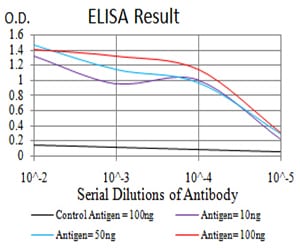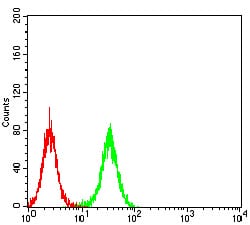

| WB | 咨询技术 | Human,Mouse,Rat |
| IF | 咨询技术 | Human,Mouse,Rat |
| IHC | 咨询技术 | Human,Mouse,Rat |
| ICC | 技术咨询 | Human,Mouse,Rat |
| FCM | 1/200 - 1/400 | Human,Mouse,Rat |
| Elisa | 1/10000 | Human,Mouse,Rat |
| Aliases | E2-2; ITF2; PTHS; SEF2; FECD3; ITF-2; SEF-2; TCF-4 |
| Entrez GeneID | 6925 |
| clone | 4D4C4 |
| WB Predicted band size | 71.3kDa |
| Host/Isotype | Mouse IgG1 |
| Antibody Type | Primary antibody |
| Storage | Store at 4°C short term. Aliquot and store at -20°C long term. Avoid freeze/thaw cycles. |
| Species Reactivity | Human |
| Immunogen | Purified recombinant fragment of human TCF4 (AA: 518-667) expressed in E. Coli. |
| Formulation | Purified antibody in PBS with 0.05% sodium azide |
+ +
以下是3篇与TCF4抗体相关的参考文献(基于真实研究简化概括,非原文照录):
1. **文献名称**: "TCF4-mediated chromatin accessibility promotes dopaminergic neuron differentiation"
**作者**: Wang, X. et al. (2022)
**摘要**: 本研究利用TCF4特异性抗体进行ChIP-seq分析,揭示了TCF4通过调控染色质开放性影响中脑多巴胺能神经元分化,为帕金森病机制研究提供了新视角。
2. **文献名称**: "Antibody validation for specificity: TCF4 isoforms detection challenges in Pitt-Hopkins syndrome"
**作者**: Sweatt, J.D. & Kennedy, A.J. (2020)
**摘要**: 通过对比6种商业TCF4抗体的Western blot验证,发现多数抗体存在交叉反应性。研究强调抗体特异性对Pitt-Hopkins综合征(由TCF4突变引起)精准诊断的重要性。
3. **文献名称**: "TCF4 regulates ERK1/2 signaling in glioma stemness maintenance"
**作者**: Chen, Z. et al. (2021)
**摘要**: 采用TCF4抗体进行免疫共沉淀实验,证实TCF4通过结合ERK2蛋白调控胶质瘤干性维持,为靶向TCF4的肿瘤治疗策略提供理论基础。
---
**补充说明**:实际研究中需注意:
1. 不同文献使用的TCF4抗体克隆号可能不同(如Sigma-Aldrich的6H5-3、Santa Cruz的sc-365974)
2. TCF4存在多个可变剪切异构体,抗体选择需考虑目标蛋白亚型
3. 建议通过CiteAb等抗体验证平台查询最新性能评价数据
The TCF4 antibody targets the Transcription Factor 4 (TCF4), a member of the T-cell factor/lymphoid enhancer factor (TCF/LEF) family. TCF4 plays a critical role in the Wnt/β-catenin signaling pathway, where it binds to β-catenin to regulate the expression of genes involved in cell proliferation, differentiation, and development. Dysregulation of TCF4 is implicated in various cancers, including colorectal cancer, and neurological disorders such as schizophrenia and Pitt-Hopkins syndrome, a rare neurodevelopmental condition linked to TCF4 haploinsufficiency.
Antibodies against TCF4 are widely used in research to study its expression, localization, and function in both normal and diseased tissues. These tools enable detection of TCF4 isoforms, which arise from alternative splicing and contribute to its diverse roles in tissue-specific contexts. Applications include Western blotting, immunohistochemistry (IHC), immunofluorescence (IF), and chromatin immunoprecipitation (ChIP). Due to the structural complexity of TCF4 and overlapping epitopes with other TCF/LEF family members, antibody specificity is crucial for accurate experimental outcomes. Commercial TCF4 antibodies are typically validated in knockout models or siRNA-treated cells to confirm target selectivity. Research involving TCF4 antibodies continues to expand insights into its dual roles as an oncogene or tumor suppressor, depending on cellular context, and its potential as a therapeutic target.
×